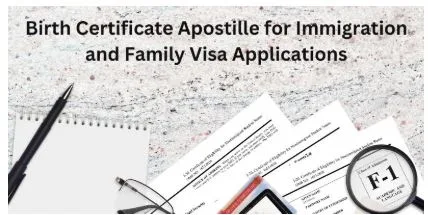Birth Certificate Apostille for Immigration and Family Visa Applications
With the world becoming more and more of a global village, families and individuals are going abroad quite often for education, work, business, or permanent resettlement. In case you are moving to be with your family, getting a dependent visa, or sending your kid to an international school, your papers need to be verified officially to be recognized by the foreign authorities. The birth certificate, as one of these indispensable documents, is the key instrument in showing the identity of a person and family relationships.
Just having a birth certificate is not sufficient when using it in a different country. The majority of foreign governments demand that the document be authenticated by the apostille process before they accept it as a valid proof. A birth certificate apostille is basically a way to show that the document is real and is acknowledged worldwide according to the Hague Convention of 1961, thus it is a must for the cases of immigration and family visa.
Understanding Birth Certificate Apostille
Apostille of a birth certificate is an official authentication of a birth certificate that one country issues and another uses. The word “Apostille” is derived from the French word that means “certification.” The Hague Convention brought it in to make the legalizing of documents more comfortable among its member countries.
If a birth certificate is given an apostille, it will have a unique sticker or seal that is given by a government-authority — in India, the Ministry of External Affairs (MEA) is the one. An apostille acts as a certification of the signature, the seal, and the issuing authority on the document thereby giving the confirmation that the document will be recognized by all other member countries of the Hague Convention and hence will not need any other embassy attestation.
Why Birth Certificate Apostille Is Required
A birth certificate is definitely among the primary personal papers. It is the record that shows the person’s name, date of birth, place of birth, and parents, thereby it is used as the main identification, nationality, and family tie proof. For multiple global formalities, an apostille birth certificate is the only accepted form to confirm these facts in a legal way in a foreign country.
Some common purposes include:
- Family Visa Applications:
Immigration authorities require proof of familial relationships for those moving abroad with their family or when applying for a dependent visa. A birth certificate with an apostille is the best way to confirm a parent-child relationship when a visa application is made. - Immigration Procedures:
Immigration departments may require an apostilled birth certificate as proof of legal identity and date of birth when one is filing for permanent residency or citizenship. - Child’s School Admission Abroad:
If parents are moving to a new country with their children, international schools might need an apostilled birth certificate to be able to register the child. - Marriage and Legal Registrations:
In some countries a birth certificate with an apostille is necessary when registering a marriage or any other legal documents where a person’s age and nationality have to be proven. - Adoption and Guardianship Cases:
In the case of a cross-border adoption or recognition of a legal guardianship, foreign authorities require a birth certificate that has been apostilled.
The Importance of Apostille for Immigration and Visa Purposes
Any documents submitted in support of an immigration or family visa application have to be legally verified. The officials overseas have to be sure that each document is genuine and that it has been issued by an official authority in the applicant’s country of origin.
The apostille makes this confirmation easier by serving as one standard authenticity certificate. Any country that is part of the Hague Convention will accept your birth certificate with an apostille without requiring further embassy legalization.
If not properly apostilled, your document could be seen as invalid or may need extra authentication, thus postponing the time of your visa approval or the application process. Therefore, getting an apostille for your birth certificate is definitely a necessary measure to facilitate the processing of immigration and family visas.
Countries That Require Apostille for Birth Certificates
The apostille is accepted by any country that is part of the Hague Convention of 1961. Some of the most frequently requested places to send to are:
- United States
- United Kingdom
- Australia
- Canada (for certain processes, legalization is still used)
- France
- Germany
- Italy
- Netherlands
- Spain
- New Zealand
- Portugal
- Switzerland
In case the country where you are headed is not a member of Hague, the way of doing things includes embassy or consulate attestation rather than an apostille. Hence, it is very important to check out the requirements of your destination first before taking any steps.
The Process of Getting a Birth Certificate Apostille in India
Getting an apostille for a birth certificate in India is a pretty involved process and goes through multiple layers of verification for the most part of it. Here is a step-by-step summary of the process:
- Obtain a Genuine Birth Certificate:
The initial step is to make sure that you possess a birth certificate that is either original or reissued from the local authority or the registrar of births and deaths. Generally, documents that are handwritten or have some kind of damage will not be allowed for an apostille. - State Home Department Verification:
Any paper which is to be given an apostille by the MEA must first be verified by the State Home Department or the Sub-Divisional Magistrate (SDM). This is a kind of state level verification of the document. - Submission to the Ministry of External Affairs (MEA):
Once state verification has been done, the paper is forwarded to the MEA that puts the apostille sticker or stamp on the back of the certificate. The sticker bears a unique identification number which can be checked on the internet. - Translation (if required):
In case the country where the documents are headed wants them to be in a specific language, a translation done by an authorized person might be needed prior to apostille.
Apostilled birth certificate is considered a valid document everywhere in member countries of the Hague Convention and can be submitted directly to foreign immigration or visa authorities. There are agency like HRD Attestation and apostille services who can get all your certificate and documents apostilled.
Why Apostille Is Preferred Over Traditional Attestation
Documents had to undergo various stages of legalization such as state authentication, MEA attestation, and embassy verification before the introduction of the Hague Convention. It was a process that took a lot of time and was quite complicated.
The apostille system changed the way these multiple steps were handled by introducing a single authentication step that is recognized in all member countries. As a result, the time, cost, and complexity of document legalization have been greatly lowered.
The apostille process is what makes the documents accepted faster, the immigration procedures smooth, and the paperwork less for families and individuals that are moving abroad.
Common Mistakes to Avoid in Birth Certificate Apostille
In order to have a process that goes smoothly, they must prevent errors such as the typical mistakes of the applicants.
- Submitting old, illegible, or handwritten certificates.
- Not getting state-level verification before MEA submission.
- Ignoring translation requirements for non-English-speaking countries.
- Using photocopies instead of original documents.
It is a great way to avoid the lengthy processes of apostille and visa that ensuring documents are properly verified, updated, and accurately translated.
How Long Is an Apostille Valid?
Usually, the apostille as such does not feature a date of expiration. Nevertheless, the validity of a paper can be limited by the rules of the country it is intended for or the authority that requires it. Certain countries may require that certificates be issued only within a short period of time, so it would be a good idea to have a freshly reissued birth certificate at hand before going through with the apostille.
Benefits of Having an Apostilled Birth Certificate
- International Acceptance: Acknowledged in all countries that are members of the Hague Convention.
- Simplified Immigration: No requirement for additional embassy legalization.
- Legal Proof: Can be used as the primary instrument to confirm one’s birth, age, and parentage in a foreign country.
- Time-Saving: Helps to cut down on the waiting time of different cases related to immigration and visa approvals.
- Digital Verification: The distinctive number of the apostille can be verified through an online portal in order to confirm its authenticity.
Conclusion
A birth certificate with an apostille is the first and foremost document in the world of international migration, which is used to prove the identity and family ties of a person. It is the means by which your private papers are welcomed by the officials of another country without any doubt, thus facilitating the whole visa or immigration procedure.
In case you are filing a petition for a family visa, a dependent visa, or permanent residency, having an apostille attached to your birth certificate is more than just a ceremonial act — it is an essential way to guarantee that your documents are in compliance with the law recognized worldwide.
With the rise of international travels, it is vital to know and carry out the apostille procedure for indispensable documents such as birth certificates in order to move smoothly from one country to another. A birth certificate that is correctly apostilled is like a relief as it secures your way to starting a new life abroad legally.



